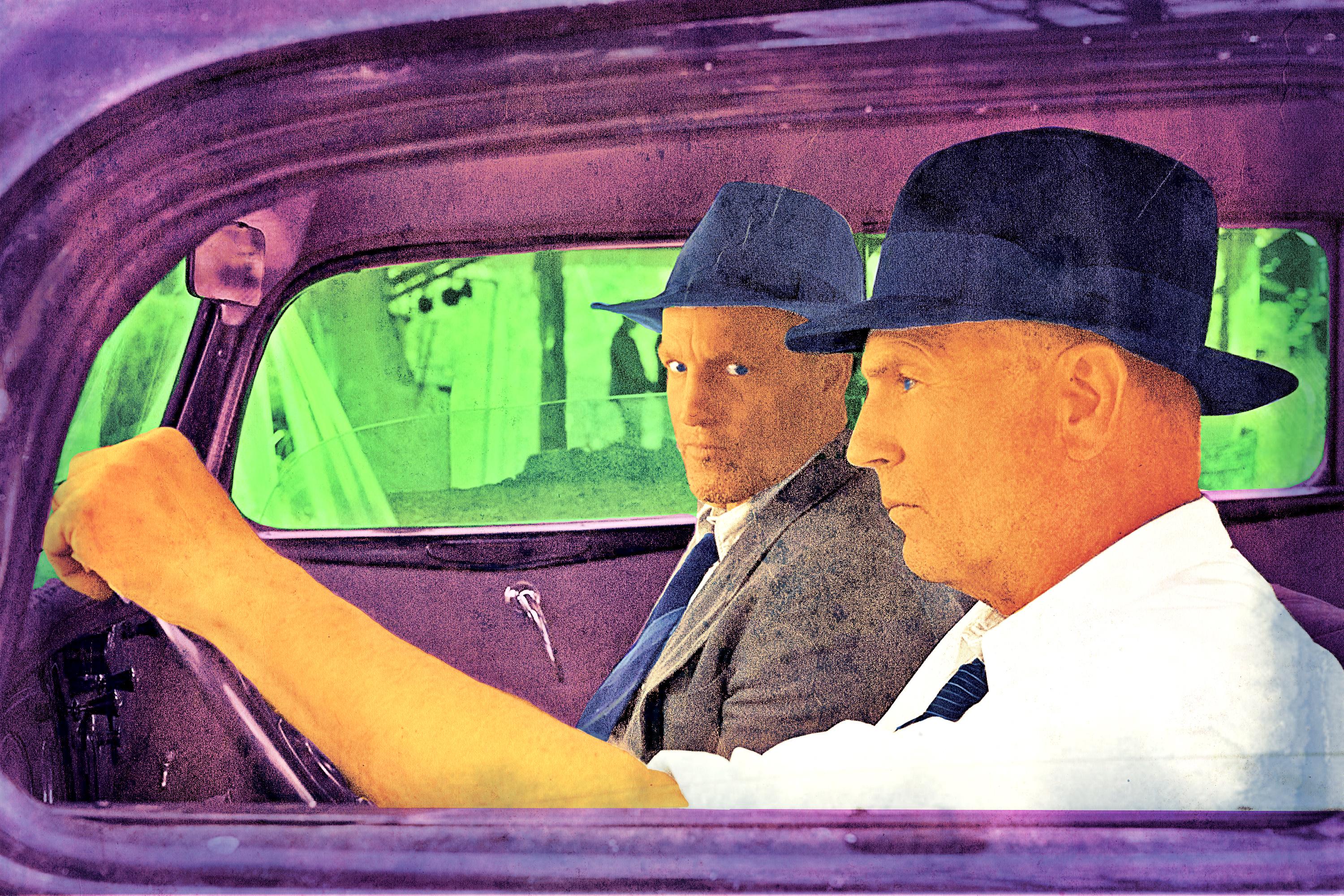
No single Netflix movie thus far is more compelling, as a pure storytelling experience, than the industry tale of how Netflix acquired that particular movie in the first place. Supermacho rom-com Triple Frontier spent 11 years in development and once involved everyone from Kathryn Bigelow to Johnny Depp to a “newly swole Tom Hanks.” Trashy Mötley Crüe biopic The Dirt is a long-threatened 2019 adaption of (and partial apology for) a lurid 2001 autobiography that chronicled (and partially apologized for) an appalling variety of 1980s hair-metal hedonism. Roma’s Oscar campaign is a sweeping epic unto itself. The Cloverfield Paradox was a D+ movie and an A+ Super Bowl Sunday stunt. To All the Boys I’ve Loved Before … actually, To All the Boys I’ve Loved Before fuckin’ rules. But a decade-plus chronicle of director swaps and casting stunts and Hollywood calamity is often an impossible act to follow.
All of which is to say that The Highwaymen, John Lee Hancock’s new 1930s drama about the two real-life former Texas Rangers who finally chased down Bonnie and Clyde, was originally supposed to reunite Robert Redford and Paul Newman. Yes, that Paul Newman, the one who died in 2008. It’s out on Netflix Friday after a limited theatrical run, now starring Kevin Costner and Woody Harrelson, who combine grizzled forces for an OK movie that doubles as an occasionally quite splendid hang. Consider it yet another slightly bent Oh, Why Not, Let’s Try It arrow in the streaming monolith’s bottomless quiver, low-stakes and medium-reward. The good news: Harrelson gives a young wannabe-gangster punk a swirlie. The bad news: The action peaks there.
Naturally, both these fellas get long, wistful monologues that’d make for fine Oscar-reel material, were this movie a legit Oscar contender. Costner, as legendary tough-guy lawman Frank Hamer, recounts the grim tale of notching his first kill when he was only 16. Not to be outdone, Harrelson, as Hamer’s more conflicted partner Maney Gault, later mournfully humblebrags about the time they helped gun down 54 outlaws in less than five minutes. “Sheesh, I’d love to watch those movies” is very much the wrong response. The Highwaymen is less a meditation on violence than a condemnation of all you desensitized Netflix subscribers titillated by violence. So maybe don’t get too excited when Hamer walks into a gun store and walks out with enough hardware to fill the 1934 equivalent of Triple Frontier’s storage container.
When our story begins, our heroes are retired and thoroughly washed, pressed back into clandestine duty only by the savagery of Bonnie and Clyde’s already two-years-long crime spree, which requires an old-fashioned and equally savage response. “Was a time we put a pair of man-killers on the trail and let them do their job,” is how an adviser to real-life Texas Governor Miriam “Ma” Ferguson (Kathy Bates, hammy but still underplayed) puts it. But those man-killers are old men themselves. Costner’s voice has an alarming Old Testament graveliness to it. There’s a running joke about how often Gault has to use the bathroom (hence the swirlie). And their grim banter runs along the lines of, “There’s always blood at the end of the road,” and “I never particularly liked the weight of deciding who gets to live and who doesn’t,” and, most importantly, “Do you ever think maybe—maybe it ain’t in us no more?”
And already the temptation to evoke, like, 10,000 other movies, current and classic alike, is overwhelming. The any-means-necessary authoritarianism of Dragged Across Concrete. A pre-swole Tom Hanks squaring off with a grizzled Paul Newman in the quite splendid Depression-era gangster fable Road to Perdition. Clint Eastwood in The Unforgiven. The Coen Brothers alone loom large enough to dwarf this whole affair, from the startled weariness of Tommy Lee Jones in No Country for Old Men—another aging lawman who just wasn’t made for these times—to the True Grit shooting contest that Costner recreates here with a couple starstruck kids, getting his point across (“Well, for pity’s take, I’m a goddamn old man”) without concocting any one detail as wonderful as Jeff Bridges’s throwing motion. Let’s just say that if Miller’s Crossing is your favorite movie, maybe just watch Miller’s Crossing again.
Oh, right, plus Bonnie and Clyde. In an excess of caution, The Highwaymen is so concerned that your mind might wander to Warren Beatty and Faye Dunaway for even one second that this time, the lovelorn monsters are barely characters at all, with almost no dialogue and zero personality, settling instead for myriad close-ups of Bonnie’s fancy shoes as she limps toward yet another gunned-down police officer. This is in keeping with the movie’s thesis, which is that the media, and an outlaw-obsessed general public that hailed two cop-killing scumbags as romantic heroes, were the true villains all along. Harrelson’s last line of dialogue is “Shame on you,” and it’s not directed at a person holding a gun. He might as well be looking into the camera.
And so you spend much of this movie in a vintage Ford with Kev and Woody (“I don’t remember a saddle being as hard on a man’s ass as these seats,” the latter observes), waiting for something bloody and spectacular to happen, and feeling bad about it. Both men are still tremendously charismatic even at their most withered, though they bring along their own unflattering comparisons. Costner has spent decades now rumbling heroically over sprawling, gorgeous American vistas and whatnot; True Detective vets have spent many hours cooped up with Harrelson in the Car of Silent Reflection. It is reasonable, one would think, to hope for at least one righteous shootout, if only to establish that these old-timers have still got it. But instead, Hamer and Gault, sidelined within a hapless multi-state manhunt run by smarmy jerks half their age, mostly prove their veteran savvy by finding old bottles in the bushes, or Sherlocking the odd footprint in the dirt, or guessing which outlaw is toting which caliber gun, or hitting on the bright idea to drop in on the outlaws’ parents.
One can conceivably luxuriate in all this, if one can draw on a bit of veteran movie-watching savvy oneself. The constant loving shots of hood ornaments. The mountain ranges of cigarette butts. The way Costner cocks a new gun next to his ear like he’s listening to the ocean in a seashell. The pronunciation of coyote where it comes out as kai-yote. All those damn sprawling, gorgeous American vistas. The No Trespassing sign riddled with bullet holes. The splendid Deadwood cast cameos—Kim Dickens as Hamer’s posh yet accommodating wife, and W. Earl Brown as one of those outlaws’ sheepish parents—a project like this verily demands. The hats, the suits. Harrelson’s wry delivery of a line like “I met my wife, she was milkin’ a prize Devon at the Oklahoma State Fair. I can’t imagine anybody writing a ballad about that encounter.” It’s a splendid hang indeed. It’s just Netflix; it don’t cost nothin’.
Unless, of course, you regard two hours and change as a cost. Historically accurate as it might be, The Highwaymen’s ending is anticlimactic to the point of farce, a final, painful slap on the wrist for all you would-be rubberneckers, violence-seekers, and outlaw-valorizers. That’ll teach you. As a cautionary tale and a morality play, it’s all too effective. That this movie finally got made is a small triumph; the movie itself, very much by design, is far less of one. It’ll look real pretty in your queue, anyway. It might play best there.

